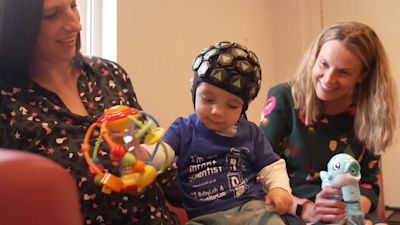Wearable baby brain scanner finds early emotional intelligence

For the first time, scientists are able to map the whole brain of a baby at once whilst it is being entertained, ITV News Science Correspondent Martin Stew repots
Most parents would love to know what’s going on inside their children’s heads. With babies, it’s almost impossible.
Not only can they not speak, but to scan their brain often requires sedation and an MRI.
That’s why scientists from UCL and Birkbeck Toddler and Baby Lab have been trialing a new wearable brain scanner for babies.
It works by shining harmless red light through the scalp and skull. The beams reflected back from the brain record levels of blood flow which allows scientists to see which parts of the brain are stimulated and when.
Subscribe free to our weekly newsletter for exclusive and original coverage from ITV News. Direct to your inbox every Friday morning.
For the first time, they’ve been able to map the whole brain at once whilst the baby is being entertained.
By comparing scans from when the baby was and was not engaged socially, scientists could see differences in activity in the prefrontal cortex. This suggests babies as young as five months old are displaying signs of emotional intelligence.
“One of the things we see is much greater interaction in social situations.” Professor Emily Jones showed me.
“Some areas of the brain are much more active when watching people singing to them and talking to them than when they are looking at toys.”
It’s been a fascinating experience for Laura Chatten, whose son Victor has been part of the trial.
“That’s really interesting how early it is because they can’t talk to us and they pick up on our queues.
"It’s so interesting to see it lit up. How the brain lights up. When you get the feedback and they tell you what it means, that's really fascinating.”
The tech can be worn by babies as young as one month old.
Studying a range of ages and conditions. One of the most exciting uses could be to diagnose and monitor neurodiverse conditions like ADHD and autism.
Scientists say the possibilities are endless, but there are no promises they’ll offer the answer to how to get your baby to sleep through.
Want a quick and expert briefing on the biggest news stories? Listen to our latest podcasts to find out What You Need To Know...